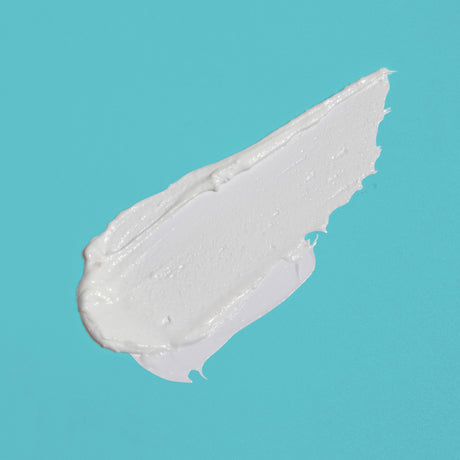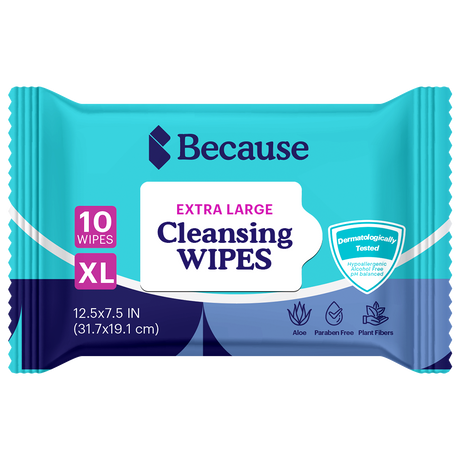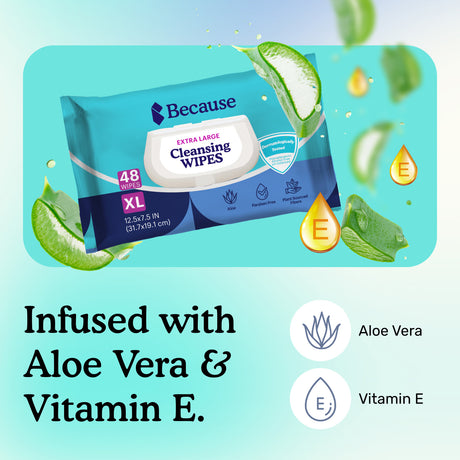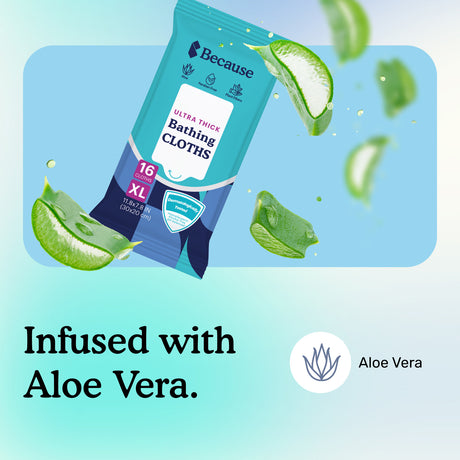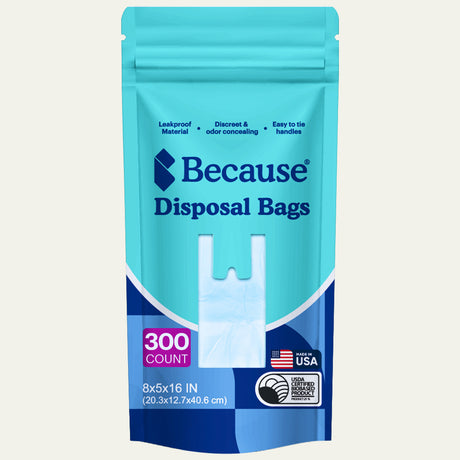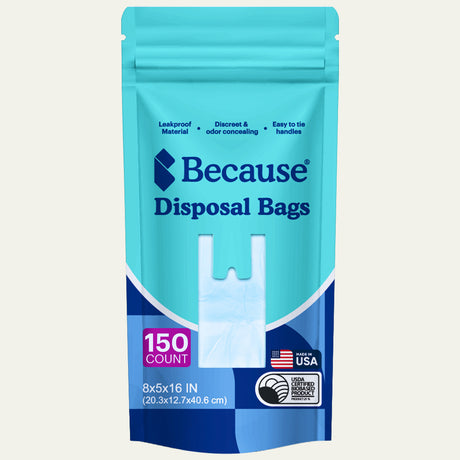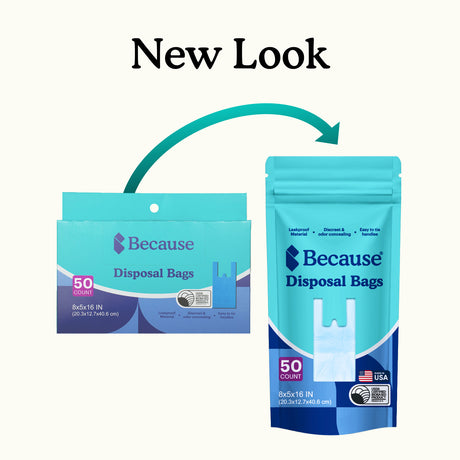Over 33 million adults in the U.S. experience bladder leaks, and finding products that help control and eliminate odor while still keeping you dry and comfortable can be a challenge. Whether you experience urinary incontinence or bowel incontinence, here are some simple ways to prevent and minimize incontinence-related odors to ensure you feel fresh and confident throughout your day.

Common Causes of Urinary Incontinence Odors
Depending on what kind of urinary incontinence you or your loved one may have, unwanted smells could be caused by a variety of factors:
- Dehydration: You may experience changes in urine odor if you’re not drinking enough water. If urine is highly concentrated, it can lead to a strong scent of ammonia.
- Leaky Pads or Underwear: Small leaks due to incorrect fit can lead to odors that build up and linger on clothes and bedsheets.
- Infrequent Changing: Extended wear of pads and diapers, particularly overnight, can cause urine to build up and odors to escape.
- UTI: A change in urine odor or color could be a symptom of a urinary tract infection.
- Odor-causing Bacteria: With prolonged exposure to the skin, urine can affect the skin’s pH level, making skin more susceptible to yeast or bacteria to grow.
Tips for Urinary Incontinence Odor Control
Stay Hydrated
Many adults with urinary incontinence or dementia are hesitant to drink lots of water during the day as this can lead to more leaks. However, this is a misconception of what causes incontinence. Most leaks are not caused by how much liquid you have in your body at the time, but rather a miscommunication between your brain’s signals and bladder muscles, a hormonal imbalance, or an injury.
Drinking water is vital to health and wellness as it supports cognitive function, fuels exercise, is essential for digestion and metabolism, regulates body temperature, and fuels weight loss. In fact, water is so important to the body that serious health conditions can arise if you’re dehydrated on a regular basis.
Another bonus of drinking plenty of water is that it dilutes urine concentration. In other words, when you’re hydrated, you can also help reduce the concentration of solutes in urine, which also reduces odor.
Prevent Leaks
Whether you’re wearing pads or leak protection underwear, incorrect fit is a leading cause of leaks. When shopping for bladder leak underwear, be sure to consult a size chart to ensure that your product will fit correctly. Ensure the leg openings contain reinforced leak guards, and that the cut of the brief has enough coverage to keep you dry and protected.
Check for UTI
If you notice any sudden changes in odor or that your urine is unusually strong, you may have a urinary tract infection. A UTI is any infection in your urinary system. The infection could be in your kidneys, bladder, ureters, or urethra, and can have a variety of different causes.
UTIs are also closely tied to urinary incontinence in some cases. If you have a UTI you may experience the intense, sudden urge to urinate and be unable to make it to the restroom. This can result in incontinence.
If you have frequent UTIs, taking a probiotic can help manage your infections, increase comfort, and keep odor to a minimum. If you’re not sure what probiotic to consider, our urinary tract health support can help.
Urinary tract health support contains cranberry juice, D-mannose, Bifidobacteria, and lactobacilli to help flush the urinary tract, combat unnecessary bacteria in the bladder, and balance the vaginal microbiome. Just take two capsules once a day and enjoy added support for your urinary system.
Look for Odor Control
When choosing incontinence products to protect you from leaks, it’s important to seek items that also offer odor protection. Look for odor protection technology that is specifically built into the construction of pads and underwear to ensure odors are neutralized. This can help prevent unwanted smells from occurring for an extended period of time.
Practice Smart Skincare
If you have incontinence, make taking care of your skin a priority. Sometimes chafing or prolonged urine exposure can lead to odor and cause irritation, discomfort, or skin conditions if you’re not careful about what products you’re using on your skin.
When looking for skincare and cleaning products that are convenient for use on the go, aim to find products with moisturizing ingredients. Keeping your skin hydrated is key to preventing irritation before it starts.

How to Get Rid of Incontinence Smell
Getting rid of unwanted odors can require a multi-step approach. Start with areas on the body, then move to clothing and bed linens, and finally, extend your odor eliminating activities to other areas of the home.
On the Body
Maintaining good personal hygiene through a regular personal care routine can help keep unwanted incontinence odors out of your home. Change absorbent incontinence products regularly to help keep urine out of direct contact with your skin for extended periods of time. In between bathing, use personal cleansing wipes and sprays to help keep skin fresh so odor-causing bacteria has less of a chance of developing on the skin.
On Clothing or Bed Linens
Washing urine or stool stains immediately is the best way to ensure effective removal of stains from clothing or bed sheets. If left for too long, stains and odors can be difficult to remove.

Don’t forget to sanitize your washing machine afterward by running a wash cycle with 1 cup of vinegar to prevent unwanted smells from transferring to your next load of laundry.
Around the Home
The most difficult urinary stains to remove are those that occur on couch cushions, chairs, or carpet. If you’re caring for a loved one with Alzheimer’s or Dementia or Multiple Sclerosis, this can be a recurring challenge, and prevention will be key. Similar to clothing, the best way to remove stains from furniture is to address it immediately. Follow these steps:
- Soak up the stain as much as you can with a dry absorbent towel or paper towels.
- Spray a mixture of 3 parts water and 1 part vinegar onto the area with a spray bottle.
- Scrub the area with a rag or sponge.
- Mix ½ cup of baking soda with a few drops of essential oil of your choice. Sprinkle this onto the stain and let sit 4-6 hours.
- Vacuum up the mixture. If you have a wet vacuum or shopvac, you can also go over the stain with this.
Enzyme-based cleaners can also help break down unwanted odors and stains. To do this, follow these steps:
- Soak up the stain as much as you can with a dry cloth
- Use a stain and odor removing spray to saturate the area. Let sit for 5-10 minutes.
- Wipe away with a clean cloth.
To prevent future stains from occurring, try using protective pads that can help you avoid messy accidents.
The Best Odor Reducing Incontinence Products
Overnight Absorbency Underwear
Absorbent underwear designed with odor protection can help neutralize and contain unwanted smells. Constructed with advanced absorption up to 6 cups, Because Market’s Overnight Underwear quickly moves liquid away from the body while locking in odor to keep you feeling and smelling fresh for up to 12 hours. Built with reinforced leak guards, the underwear is designed for maximum containment.
Maximum Absorbency Pads
If you or your loved one prefers to wear pads or guards, Because Market’s Maximum Pads offer up to 2 cups of leak protection. Made with a fast-acting absorbent gel layer, they are designed with odor neutralizers to help contain urine odors.
Disposable Bags
Ensuring that you have an odor-proof method of disposing of incontinence pads and underwear can help contain unwanted smells. These disposable bags are large enough to hold your incontinence products, can be sealed off, and contain a scent to help mask unwanted odors.
Odor Spray
Odor and stain removing sprays can be a quick, convenient way to remove stains, particularly from difficult to clean surfaces like couches, chairs, and rugs. This odor removing spray uses a proprietary enzyme based formula to break down urine odors and leave behind a fresh citrus scent.
Flushable Wipes
Another way to help keep odor to a minimum is by using flushable wipes. It’s important to find wipes that hydrate skin instead of drying it out. The best way to do this is to look for wipes that don’t contain alcohol.
Even though it’s known for its antibacterial properties, alcohol tends to dry out the skin, leaving it dry, uncomfortable, and even sometimes broken. This can lead to infection and other negative side effects, so it’s vital to keep your skin hydrated.
Instead, try these Extra-Large Cleansing Wipes designed specifically for incontinence care. They’re made with aloe vera and vitamin E for soothing skin and are pre-moistened for comfort. These provide an easy way to stay fresh and smelling good, even if you’re on the go.
When to Talk to Your Doctor
If you see sudden changes in the color, smell, or consistency of your urine that lasts for more than a few days, you should contact your doctor or health care provider. Be sure to take note how long your symptoms have been occurring, along with any changes to your medications or diet so you can provide your doctor the best information for an accurate diagnosis.
Are you caring for someone with incontinence? Take our Bladder Protection Quiz and get a starter pack for your loved one to try today!
If you're struggling with incontinence, join one of our private support groups today!
Women's Incontinence Support Group
Men's Incontinence Support Group
Sources:
Mayo Clinic. (n.d.). Urinary tract infection (UTI) - Symptoms and causes. Retrieved from https://www.mayoclinic.org/diseases-conditions/urinary-tract-infection/symptoms-causes/syc-20353447
Harvard T.H. Chan School of Public Health. (2016). The importance of hydration. Retrieved from https://www.hsph.harvard.edu/news/hsph-in-the-news/the-importance-of-hydration/#:~:text=Drinking%20enough%20water%20each%20day,quality%2C%20cognition%2C%20and%20mood.
Cleveland Clinic. (n.d.). Urine changes. Retrieved from https://my.clevelandclinic.org/health/diseases/15357-urine-changes
Mayo Clinic. (n.d.). Urinary tract infection (UTI) - Symptoms and causes. Retrieved from https://www.mayoclinic.org/diseases-conditions/urinary-tract-infection/symptoms-causes/syc-20353447
Mayo Clinic. (n.d.). Urinary incontinence - Symptoms and causes. Retrieved from https://www.mayoclinic.org/diseases-conditions/urinary-incontinence/symptoms-causes/syc-20352808
Cleveland Clinic. (n.d.). Urine changes. Retrieved from https://my.clevelandclinic.org/health/diseases/15357-urine-changes


